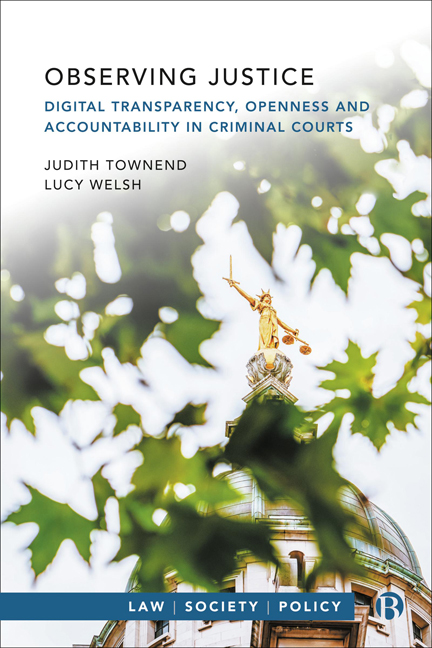Book contents
- Frontmatter
- Contents
- Series Editor’s Preface
- About the Authors
- Acknowledgements
- ONE Introduction: Why We Need to Rethink Approaches to Open Justice in the Criminal Courts
- TWO A History of Accountability in Criminal Courts
- THREE Justice System Modernisation, Digitalisation and Data
- FOUR The Role of the Public and Media in Observing Justice
- FIVE The Human Impact of Justice System Transparency
- SIX Conclusion: Towards a New Framework for Justice System Accountability
- References
- Index
FIVE - The Human Impact of Justice System Transparency
Published online by Cambridge University Press: 28 March 2024
- Frontmatter
- Contents
- Series Editor’s Preface
- About the Authors
- Acknowledgements
- ONE Introduction: Why We Need to Rethink Approaches to Open Justice in the Criminal Courts
- TWO A History of Accountability in Criminal Courts
- THREE Justice System Modernisation, Digitalisation and Data
- FOUR The Role of the Public and Media in Observing Justice
- FIVE The Human Impact of Justice System Transparency
- SIX Conclusion: Towards a New Framework for Justice System Accountability
- References
- Index
Summary
Introduction
Media reporting, the focus of Chapter 4, is a widely accepted – indeed celebrated – part of the open justice process and as such certain practices are unquestioned, not least the inclusion of personal and identifying information about those involved in court cases. As Hess and Waller explain it, ‘[u] nder the doctrine of open justice, being subjected to media publicity of an alleged crime is presented as a sometimes unfortunate, but unavoidable, price of the system’ (2013, p 66). To make the court reporting job practicable, journalists accept that they will report embarrassing or humiliating details about people (Conley and Lamble 2006). But undoubtedly there is a cost and human impact to this type of reporting, whether or not it is justified as unavoidable collateral harm of the process, or seen as an unwarranted damaging intrusion of privacy. As Stacey identifies, ‘with increasing moves towards online publicizing of court decisions, it is likely that the number of people affected by the online publication of spent criminal records will only increase’ (2017, p 274). It is this territory we now explore, asking what is the human impact of justice system transparency, and are current practices fair?
Curiously, despite the extensive jurisprudence on open justice and a rich academic literature in media and crime (see, for example: Greer 2010; Schlesinger and Tumber 1994), there is limited empirical material on which to draw to explain the ‘human impact’ of criminal court reporting and justice data sharing practices that have developed over time. Perhaps predictably, studies on court reporting written within journalism studies have tended to concentrate on the rights and experiences of journalists (Chamberlain et al 2021; Jones, R. 2021; Smith et al 2022), with rare exceptions, such as work in Australia that has questioned the role of the ‘media pillory’ when reporting minor offences (Waller and Hess 2011). In legal scholarship, analyses tend to concentrate on doctrinal argument and lack socio-legal empirical evidence (Jaconelli 2002; Bohlander 2010; Craig 2019); and most have not been concerned with the practical effects or detail of contemporary justice system data management.
Perhaps most worryingly, we have found very limited consideration of ‘human impact’ in policy developments over the past decade. There have been limited opportunities to engage in public consultation on open justice mechanisms and justice system data management, and official reports have present unevidenced and uncritical assumptions about the role and impact of open justice mechanisms.
- Type
- Chapter
- Information
- Observing JusticeDigital Transparency, Openness and Accountability in Criminal Courts, pp. 93 - 119Publisher: Bristol University PressPrint publication year: 2023



